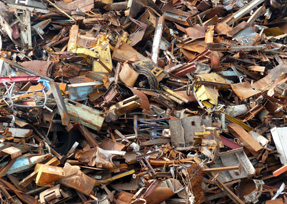Industrial waste can be recycled in two ways, by direct recycling or by sending it to recycling plants. Direct recycling, also known as on-site recycling consists of recycling waste within the premises of the industrial facility itself, whereas the other option is to send it off-site to commercial recycling plants that recycle waste from numerous industrial units.
-
In the glass industry, broken or misshapen glass is regularly recycled. It can be reused in the production process.
-
The waste generated in agriculture based industries can be used as landfills or used to generate bio-gas. Bio gas plants provide the units with cheap energy, and generate byproducts such as natural fertilizers, and cattle bedding which can be sold back to farms.
-
Food processing industries can set-up biogas plants and gainfully utilize organic waste matter such as worm infested grains, rotten fruit, and oil cake, which are otherwise difficult to dispose off. The recycling process generates energy, which can be used in the industry itself – thereby saving on energy bills and it also produces fertilizers, which can be sold off to agricultural farms.
-
Large amount of waste is generated by the paper industry by way of damaged paper rolls etc. The paper mill can recycle and reuse this, along with used paper by reintroducing it in the pulping process.
-
In the construction industry, most of the wastes like timber, concrete, shingles, and bricks, gypsum drywalls generated from activities such as demolitions can be reutilized. Road construction is an area where recycled asphalt shingles and recycled concrete aggregate find a lot of application. Recycled concrete aggregate is also used as pipe bedding and as landscape material as it offers good support. Recycled gypsum from scrap drywall finds application in horticulture and agriculture as a soil additive.
-
Plastic is a major waste product generated in industries and one whose quantity is increasing every year. Plastic that can be easily melted is usually recycled and remolded to form new products and goods. The packaging industry is one of the biggest consumers of plastic.
-
Metallic waste generated in the metal industry, and elsewhere in manufacturing industries comprises of metals such as aluminum, iron and steel, zinc, and copper can be reprocessed and reused to create new products.
-
In the hospitality industry, the waste generated is as diverse as the amount of waste created. One can recycle products like old newspapers and office paper, glass bottles, metal containers, and furnishings. Old furniture can be repaired and sold while food from restaurants can be used to generate biogas and compost for gardens.
...Read more
Close










